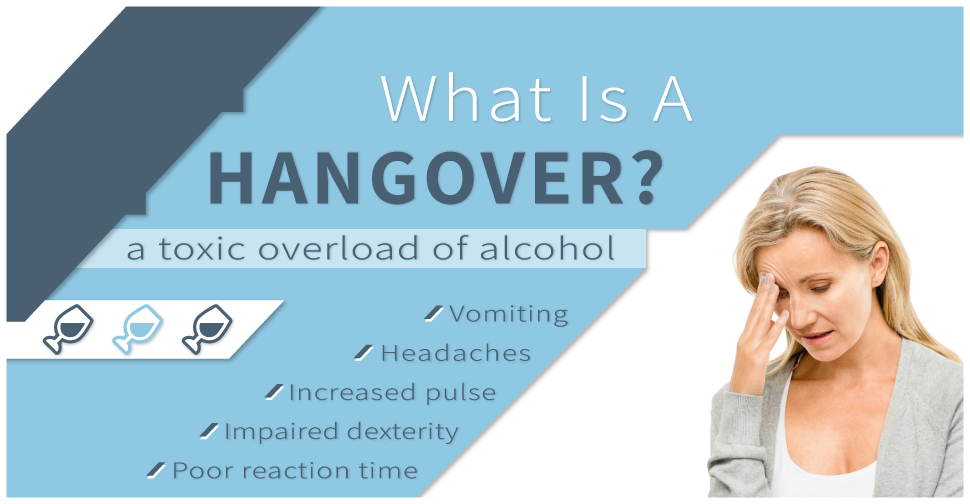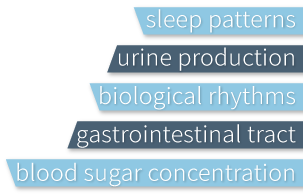
A hangover is something a fair amount of people who consume alcohol have either experienced or witnessed in a friend or loved one. It is something that might be joked about the next day after drinking an excessive amount of alcohol, however, it is something that should be considered quite seriously. A hangover isn’t just a simple headache and it goes beyond the fuzzy feeling or nausea; it is indicative of a greater problem, that your body experienced a toxic overload of alcohol.
What Causes A Hangover?
Most people could tell you that a hangover is brought about by excessive alcohol (ethanol) use, and for some, this amount is in actuality quite small. However, fewer people may be able to tell you exactly why a person feels this way. Hangovers often occur from a harmful pattern of alcohol consumption called binge drinking.
Alcohol exerts a vast impact on the body and mind. It detrimentally affects a wide variety of internal organs and impacts cognitive functioning. One scientific report, titled “Alcohol Hangover,” cites that “Multiple possible contributors to the hangover state have been investigated, and researchers have produced evidence that alcohol can directly promote hangover symptoms through its effects on urine production, the gastrointestinal tract, blood sugar concentrations, sleep patterns, and biological rhythms.”

When a person consumes alcohol, it is readily absorbed from the stomach into the bloodstream and then crosses the blood-brain barrier. At this point, the impact on the brain is what causes the pleasurable feelings that arise within the early stages of drinking. Somewhere near this point, a person’s body begins to process blood sugar in a less effective manner.
In addition to this, as someone begins to consume more alcohol to increase this feeling, the brain and body become more overloaded with the chemicals within alcohol, and the body has to work harder to process it. During this time, certain organ systems that are responsible for processing and metabolizing the alcohol become overburdened, these include the drinker’s liver and kidneys. As these systems struggle to keep up, and if he or she continues to drink, a greater amount of toxins build up, and the body cannot keep up with the elimination process.
Remember, even though to you it seems that alcohol is fun, to your body it is viewed as a poison that it is trying to rapidly eliminate. Here we show you the reasons why hangovers may exist:
Chemical burden – This toxicity is caused not only by the ethanol itself, but by the toxic chemical byproducts that result from its metabolization, one of which is acetaldehyde. Acetaldehyde builds up within your blood as you liver works towards breaking down the alcohol in preparation for its elimination. As your liver continues to work towards eliminating the ethanol, it becomes even more taxed by the presence of this chemical, thus certain other equilibriums falter. Due to this, your blood sugar has trouble staying maintained.
Though this chemical is no longer present in high concentrations during the time after your blood alcohol drops to zero, researchers theorize that it has the ability to impact a person’s body in such a way that its effects linger after its toxicity peaks.
 Imbalances to your blood sugar – As we’ve noted above, your body’s blood sugar fluctuates while the alcohol is being metabolized. Some research shows that a drop in blood sugar (hypoglycemia) occurs more frequently in those who are chronic drinkers, however, any imbalance in this way may further aggravate a hangover.
Imbalances to your blood sugar – As we’ve noted above, your body’s blood sugar fluctuates while the alcohol is being metabolized. Some research shows that a drop in blood sugar (hypoglycemia) occurs more frequently in those who are chronic drinkers, however, any imbalance in this way may further aggravate a hangover.
Gastrointestinal stress – Alcohol hits your stomach first. Due to its chemical components, alcohol can irritate the lining of your stomach and intestines. The prior report we mentioned expounded on this, saying, “In addition, alcohol increases the production of gastric acid as well as pancreatic and intestinal secretions. Any or all of these factors can result in the upper abdominal pain, nausea, and vomiting experienced during a hangover.”
Immune response – There is an interesting perspective that may account for the tiredness, muscle aches, nausea, headache, and cognitive impact. One study sought to understand the connection between cytokines and hangovers. Cytokines are molecules that work within the body to trigger an inflammatory reaction during an infection. They report that research illustrates that these molecules are actually released during bouts of excessive alcohol consumption, which may be why certain symptoms arise.
Effect on circulatory system – Alcohol dilates your blood vessels, which can cause a headache.
Sleep – Contrary to what some people might think, alcohol doesn’t help you to have a better sleep. On the contrary, it can actually offset your body’s sleep and wake cycle, called your circadian rhythm. It may also upset the production of a chemical called cortisol that is related to this cycle. The “Alcohol Hangover” report tells us that “Overall, alcohol’s disruption of circadian rhythms induces a“jet lag”that is hypothesized to account for some of the deleterious effects of a hangover.” Typically, the less sleep a person gets, the greater the hangover.

What Are The Symptoms Of A Hangover
Processing alcohol at all requires energy output from your body. Processing these great amounts of alcohol exerts an even larger strain on your organs. Due to this, and for the reasons we explained above, a person will often experience discomfort and a sense of malaise, even after their blood alcohol content has returned to zero. The symptoms of a hangover can last upwards of 72 hours. They range anywhere from being a mild annoyance to the more severe and temporarily debilitating symptoms that can be caused from intense and dangerous sickness.
Symptoms include:
- Headache
- Diarrhea
- Nausea
- Vomiting
- Increased pulse
- A sense of weakness or tiredness
- Shakiness
- Impaired dexterity or troubles with your equilibrium
- Poor reaction time
- Impaired visual-spatial perception
- Depression and/or anxiety
If you see any of these symptoms after a night of drinking, take the time to consider the impact that the alcohol had on your body and mind. These symptoms arise from the toxic burden the alcohol places on your body. In some cases, the patterns of drinking that result in a hangover may warrant concern.
Are There Specific Factors That Influence A Person’s Chances Of A Hangover?
As with any substance abuse, the exact impact varies person to person. These factors may include your weight, your gender, the condition of your liver, your ethnicity, your level of hydration before, during, and after drinking; if you ate anything during these same periods, and the amount and frequency by which you drank. People that suffer from migraines manifest a greater instance of hangovers. Alcoholics may not be as apt to get them when drinking the same amount of alcohol as other people, as a result of heightened tolerance.

Medications can also affect this, due to their ability to alter your body’s chemistry and ability to metabolize the alcohol. Some may help a person to process it more efficiently, whereas others may impede the processes that are necessary to break the alcohol down. For these reasons, the amount of alcohol needed to create a hangover varies per person.
Binge Drinking, A Risky Behavior
A hangover may be indicative of a greater problem. In many cases, a hangover is the result of binge drinking, which according to CDC, is the most pervasive pattern of excessive consumption in the United States today. The National Institute on Alcohol Abuse and Alcoholism’s (NIAAA) defines binge drinking as “a pattern of drinking that brings blood alcohol concentration (BAC) levels to 0.08 g/dL. This typically occurs after 4 drinks for women and 5 drinks for men—in about 2 hours.”
Binge drinking is not merely a fun night out, it is a problematic pattern of behaviors that carries significant dangers and health risks. They include, but are not limited to: liver disease, neurological damage, cognitive impairment, stroke, alcohol poisoning, coma, and even death. Binge drinking is a serious problem that may transpire into more serious patterns of alcohol abuse and addiction. It is a behavior that should be addressed to alleviate these future concerns and remove these risk factors.
Are There Treatments?
Currently, there are no treatments for hangovers other than patience, time, and perseverance. In addition to this, there are no surefire methods of avoiding one, other than to not drink, or to be very mindful of drinking in a moderate manner.
When you drink, you should always be mindful of consuming water and staying hydrated, as dehydration is a key component to a hangover. This holds true the next day, staying hydrated can help you to feel better. In addition, sports drinks that work towards rebalancing your electrolytes may be useful.
If your hangover is symptomatic of a greater problem with substance abuse, therapy or rehabilitation may be necessary, this is dependent on the extent of the alcohol abuse or addiction.
Don’t Let Your Drinking Ruin Your Day Or Your Life
A bad hangover can ruin your day, while alcohol abuse and addiction can ruin your life. If you’re worried that you’re hangover, or that of a loved one is  indicative of a greater concern with alcohol abuse, please contact us at DrugRehab.org. Your life doesn’t have to be negatively impacted by alcohol forever. We can help you find freedom and wellness. We understand your concerns and will do everything in our power towards directing you to the tools and information you need to make an informed decision about treatment.
indicative of a greater concern with alcohol abuse, please contact us at DrugRehab.org. Your life doesn’t have to be negatively impacted by alcohol forever. We can help you find freedom and wellness. We understand your concerns and will do everything in our power towards directing you to the tools and information you need to make an informed decision about treatment.
Sources
John Hopkins Medicine – Hangover Headache
National Institutes of Heath – Alcohol Hangover
ResearchGate – Effects of alcohol hangover on cytokine production in healthy subjects
Mayo Clinic – Hangovers

